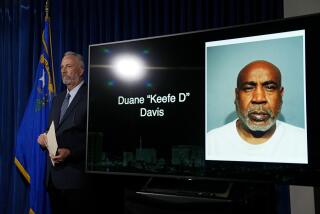Police to Investigate Death of Heiress : Courts: Action comes after New York probate judge orders inquiry into nurse’s charge that philanthropist Doris Duke was massively sedated in 1993.
- Share via
The district attorney’s office said Tuesday that it will ask Los Angeles police to look into the death of Doris Duke after a nurse’s charge that the tobacco heiress and philanthropist “did not die of natural causes” in her Beverly Hills mansion in 1993.
A spokeswoman for Dist. Atty. Gil Garcetti confirmed that information from multiple sources--gathered during the contested probate of Duke’s will in New York--is being forwarded to police for investigation.
“We are aware of the allegations,” said spokeswoman Sandi Gibbons.
The action comes three days after a Surrogate’s Court judge in New York ordered a separate investigation by Richard Kuh, a former Manhattan district attorney, into allegations that Duke may have been murdered through systematically administered overdoses of drugs instigated by her butler, Bernard Lafferty.
In Duke’s final will, Lafferty was named co-executor of her more than $1.2 billion estate, along with U.S. Trust Co. of New York.
The stewardship of the estate--one of the largest ever offered for probate in New York--is under court challenge by several former employees of the heiress and by Dr. Harry B. Demopoulos, a former Duke physician, who had been named her executor in a prior will.
The charges that Duke succumbed at the age of 80 to a “massive sedation regime” were made in an affidavit filed in the probate case by one of her home care nurses, Tammy Payette. Payette accompanied the heiress in an ambulance to her Beverly Hills estate, known as Falcon’s Lair, from Cedars-Sinai Medical Center after Duke underwent treatment for a series of strokes.
Payette said her patient was “in good stable condition and alert” after leaving the hospital and had the potential to be rehabilitated “to some form of independence” with continued nursing care. She estimated Duke’s life expectancy to be at least five years.
At Falcon’s Lair, Duke was under the care of a round-the-clock team of nurses, including Payette, until she died Oct. 28, 1993.
On Tuesday, a public relations counsel for Lafferty released a statement from another nurse, Pearl Rosenstein, stating that Duke had received “superb medical care.”
Rosenstein, who also was on duty when Duke died, said she was “horrified” by the charges brought by Payette.
“Payette’s assessment that Miss Duke was recovering from her July, 1993, stroke and Payette’s charge of a fiendish plot to sedate the patient to death are contrary to the medical reality and fly in the face of all reason,” Rosenstein said.
Rosenstein said the medical care Duke received “was administered with the intention of sparing her pain and discomfort.”
“Doris Duke was never over-medicated,” the nurse added.
However, another affidavit filed by Colin Shanley, a cook Duke employed, contradicts Rosenstein on several points.
Shanley said he was in the kitchen of Falcon’s Lair with Lafferty the afternoon of the day before Duke died. A package was delivered to the estate’s back gate and was brought to the kitchen by a security guard, he said.
“I received the parcel and read aloud to Lafferty the sender and addressee information,” Shanley said. “Upon hearing the information, Lafferty leapt across the kitchen, grabbed the parcel out of my hands and stated that ‘Miss Duke is going to die tonight.’ ”
Shanley said that at first he did not believe the butler because Lafferty “had made these claims numerous times in the previous months.”
“A short time later, when one of the afternoon shift nurses came up to the kitchen to use the phone, I heard her telling the night shift nurses that they ‘wouldn’t be needed.’ I then began to suspect Lafferty’s statement might be true,” the cook said in his affidavit.
Court papers filed by Raymond J. Dowd, a Manhattan lawyer representing Shanley, charge that it was Rosenstein who made the call canceling the late shift.
According to the court papers from Shanley’s lawyer, the package delivered to the kitchen “contained a potentially lethal dose of Demerol.”
Contacted by phone Tuesday, Rosenstein said: “I do not have a statement.”
Eric Dobberteen, a Los Angeles lawyer representing Rosenstein, declined to comment on Shanley’s Jan. 18 affidavit. “I have never heard these allegations before,” the lawyer said. “I just cannot comment on anything I have not heard about. . . . He’s in litigation with members of the estate. You draw your own conclusions.”
Suzelle Smith, a Los Angeles lawyer representing Demopoulos, said Tuesday that she and her partner Don Howarth were informed by attorneys for the Duke estate that the estate had retained lawyers for Rosenstein and was paying the nurse’s legal bills.
The U. S. attorney’s office in Manhattan has declined any comment on the bitter fight over Duke’s will. But it was understood that it sent information to Los Angeles authorities.
According to the court papers, Dowd contacted federal prosecutors in Manhattan on Dec. 5 after Shanley informed him “that an eyewitness to Doris Duke’s death had told him that Doris Duke had been murdered.”
Both Dowd and Shanley met with the prosecutors later in the month. The lawyer said that after the meetings, he was assured a “full and fair report” would be sent to the appropriate authorities in Los Angeles.
Goldman reported from New York and Lopez reported from Los Angeles.
More to Read
Sign up for Essential California
The most important California stories and recommendations in your inbox every morning.
You may occasionally receive promotional content from the Los Angeles Times.













